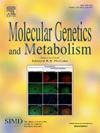cPMP 在偶然的早期诊断后挽救了一名患有严重钼辅助因子缺乏症的新生儿,并确定了新型 MOCS1 变体的特征。
IF 3.7
2区 生物学
Q2 ENDOCRINOLOGY & METABOLISM
引用次数: 0
摘要
我们报告了第一例,也是迄今为止唯一的一例新生儿发病急性髓系白血病 A 型患者,该患者得到了早期诊断并接受了 cPMP 治疗,从而避免了严重的脑损伤和残疾。该患儿在出生 10 小时后出现低血糖,因偶然发现血浆中左旋胱氨酸严重减少而被确诊。由于高度的认识以及代谢实验室和临床服务部门之间的良好合作,在严重脑病发生之前就启动了 cPMP 替代治疗,患儿随后的运动发育正常。该患儿直到今天(7 岁)仍每天服用 cPMP 替代药物,其长期发育结果令人满意。然而,长期随访发现,患儿有明显的交流障碍,认知能力处于轻度至中度学习障碍的范围。生化异常的程度和潜在基因变异的进一步功能特征证实了代谢性疾病的严重性。该病例进一步证明,如果及早应用 cPMP 替代治疗,确实能显著改变疾病的病程。尽管该病例的生化异常持续完全恢复正常,但出生后的治疗不足以使其认知发育完全正常。本文章由计算机程序翻译,如有差异,请以英文原文为准。
cPMP rescue of a neonate with severe molybdenum cofactor deficiency after serendipitous early diagnosis, and characterisation of a novel MOCS1 variant
We report the first, and so far, only index patient with neonatal onset MoCD type A who was diagnosed and treated early enough with cPMP to avoid severe brain injury and disability. The child presented with hypoglycemia at the age of 10 h and was diagnosed because of the incidental finding of severely decreased L-cystine in plasma. Due to a high level of awareness and excellent co-operation between metabolic laboratory and clinical services, cPMP substitution could be initiated before severe encephalopathy set in, and the child subsequently had a normal motor development. The child has been continued on daily substitution with cPMP until today (age 7 years) and has shown a satisfying long-term developmental outcome. Long-term follow-up, however, revealed significant communication difficulties and cognitive abilities in the range of mild to moderate learning disability. The severity of the metabolic disease was confirmed by the extent of biochemical abnormalities and further functional characterisation of the underlying genetic variants. This case provides further evidence that cPMP substitution does significantly alter the disease course when applied early enough. Postnatal treatment in this case was not sufficient to enable an entirely normal cognitive development, despite sustained complete normalization of the biochemical abnormalities.
求助全文
通过发布文献求助,成功后即可免费获取论文全文。
去求助
来源期刊

Molecular genetics and metabolism
生物-生化与分子生物学
CiteScore
5.90
自引率
7.90%
发文量
621
审稿时长
34 days
期刊介绍:
Molecular Genetics and Metabolism contributes to the understanding of the metabolic and molecular basis of disease. This peer reviewed journal publishes articles describing investigations that use the tools of biochemical genetics and molecular genetics for studies of normal and disease states in humans and animal models.
 求助内容:
求助内容: 应助结果提醒方式:
应助结果提醒方式:


